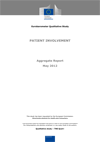
Some key findings of the report:
- The term "patient involvement" is not clearly understood by either patients or practitioners and often means different things to different people. Many patients describe a "traditional doctor-patient relationship", where the doctor's opinion is considered as being beyond questioning and patients feel uncomfortable giving feedback.
- Communication is considered very important, but both patients and practitioners describe how doctors have insufficient time to explain treatment options.
- The main risks of patient involvement, mentioned by both patients and practitioners, are increased demands on practitioners' time, and the possibility of patients disagreeing with doctors' opinions. This would also have financial implications.
- The Internet is generally felt to be the area where there has been the most significant development with almost all patients now having greater access to information about their symptoms and healthcare (as well as healthcare options). This is seen as positive by patients but is more ambivalent for some practitioners.
- Patients in Eastern European countries are most likely to be dissatisfied with their current level of involvement in healthcare and want to be more involved. However, this response is not universal.
- Chronically ill patients tend to have more experience in self-monitoring and often have a more tangible understanding of "patient involvement".
This research was qualitative in nature and is therefore not intended to be representative of the views of either practitioners or patients in the participating countries. Conclusions reflect the experience and views of those who took part in the study. It provides interesting topics raised in the interviews about patient involvement in clinical practice.
Download Eurobarometer Qualitative Study: Patient Involvement (.pdf, 915 KB).
Download from eHealthNews.eu Portal's mirror: Eurobarometer Qualitative Study: Patient Involvement (.pdf, 915 KB).